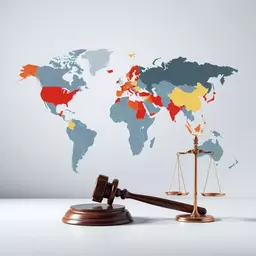Cooperation on Red Notices Explained

Did you know that effective international cooperation can significantly enhance the enforcement of legal actions across borders? Understanding the complexities of INTERPOL Red Notices is key for anyone interested in international law and justice.
What You Will Learn
- Purpose of Red Notices: Red Notices are critical tools for locating and provisionally arresting individuals pending extradition, enhancing global law enforcement collaboration.
- Role of National Central Bureaus (NCBs): NCBs serve as vital links between national authorities and INTERPOL, facilitating information exchange and coordination in international police cooperation.
- Importance of Legal Consistency: Harmonizing legal frameworks among member states reduces discrepancies in handling Red Notices and promotes effective cooperation.
- Collaboration with Human Rights Organizations: Engaging with these organizations helps ensure fair treatment and accountability in Red Notice practices.
- Need for Continuous Improvement: Streamlining processes and establishing clear guidelines can enhance the effectiveness of INTERPOL's operations and uphold individuals' rights.
Key Aspects of INTERPOL Red Notices and International Collaboration
Understanding the crucial functions of INTERPOL Red Notices and the cooperation among member countries is vital for effective international law enforcement. For more insights into navigating these challenges, explore strategies for responding to an INTERPOL Red Notice.
Purpose of Red Notices
- Locate individuals wanted for prosecution.
- Request arrest of individuals by member countries.
- Share information on criminal backgrounds.
Framework of International Cooperation
- 196 member countries collaborating effectively.
- Prompt action on Red Notices for apprehending fugitives.
- Enhanced communication through National Central Bureaus (NCBs).
Role of National Central Bureaus (NCBs)
- Facilitate information exchange on Red Notices.
- Coordinate international police cooperation responses.
- Provide resources to local law enforcement.
Challenges and Areas for Improvement
- Need for legal consistency among member states.
- Investment in training for law enforcement.
- Streamlining processes for quicker resolutions.
Understanding INTERPOL Red Notices and Global Cooperation
As we delve into the intricate world of international law enforcement, it’s essential to grasp the vital role of INTERPOL Red Notices. These notices serve as requests to locate and provisionally arrest individuals pending extradition, surrender, or similar legal actions. They play a crucial role in the global effort to combat crime, providing law enforcement agencies the tools they need to work together across borders.
But what exactly does this mean? When a country issues a Red Notice, it essentially signals to other member states that they should be on the lookout for a wanted person. This does not suggest the individual is guilty; rather, it's a means of alerting international authorities about someone who needs to be apprehended. Understanding this is fundamental for anyone interested in the complexities of extradition and international cooperation.
Defining Red Notices: Purpose and Functionality
The purpose of a Red Notice is multi-faceted. It allows law enforcement agencies to:
- Locate individuals who are wanted for prosecution or to serve a sentence.
- Request the arrest of these individuals by the member countries.
- Share critical information regarding the wanted person's identity and criminal background.
It’s crucial to note that a Red Notice is not an international arrest warrant. Instead, it serves as a tool for collaboration, enhancing countries' ability to manage cross-border crime more effectively.
The Framework of International Cooperation among Member Countries
With 196 member countries, INTERPOL creates a robust framework for international collaboration. This cooperation is essential for the effective issuance and execution of Red Notices. Member countries typically agree to:
- Share information about criminal activities and wanted individuals.
- Act promptly on Red Notices to apprehend fugitives.
- Maintain communication through National Central Bureaus (NCBs) to facilitate coordination.
Through this cooperative structure, countries can enhance their law enforcement capabilities. The interconnectedness of jurisdictions helps ensure that justice is pursued effectively across borders, particularly when considering extradition laws in the UAE.
The Role of National Central Bureaus (NCBs)
National Central Bureaus (NCBs) are the backbone of INTERPOL's operations, acting as a bridge between national law enforcement and INTERPOL’s international network. NCBs play a critical role by:
- Facilitating the exchange of information between countries regarding Red Notices.
- Coordinating responses to requests for international police cooperation.
- Ensuring that local law enforcement has access to the necessary resources and information.
As someone deeply involved in understanding extradition laws, I can attest that the efficiency of NCBs significantly impacts the success of international law enforcement efforts. They not only streamline communication but also enhance the overall effectiveness of Red Notices.
Pro Tip
Did you know? When dealing with INTERPOL Red Notices, it's vital to ensure your legal team is well-versed in international extradition laws. This expertise can make a significant difference in how effectively a Red Notice is contested or managed, safeguarding the rights of individuals while navigating complex legal landscapes.
The Importance of International Collaboration on Red Notices
Understanding the significance of international collaboration on Red Notices is crucial, especially for those navigating the complexities of extradition law. Effective cooperation among member countries not only enhances the enforcement of Red Notices but also addresses the challenges that arise in diverse legal systems. As someone deeply involved in this field, I believe that fostering collaboration can lead to more efficient justice processes.
To summarize the key takeaways regarding Red Notices and the roles of member countries, consider the following points:
- Unified Efforts: Countries must work together to ensure timely and accurate enforcement of Red Notices.
- Legal Consistency: Member states need to harmonize their legal frameworks to minimize discrepancies in handling notices.
- Training and Resources: Investing in training for law enforcement agencies is essential to effectively use Red Notices.
Encouraging Continuous Improvement in Legal and Procedural Frameworks
As we continue to explore the landscape of INTERPOL and Red Notices, the necessity for ongoing reforms cannot be overstated. Transparency and due process are fundamental to maintaining trust among member states. By enhancing these aspects, we can create a more reliable system that upholds the rights of individuals.
Here are a few areas where reforms should focus:
- Streamlined Processes: Simplifying the issuance and execution of Red Notices can lead to quicker legal resolutions.
- Clear Guidelines: Establishing clear guidelines on the criteria for issuing Red Notices can help prevent abuse.
- Monitoring Mechanisms: Implementing robust monitoring mechanisms will ensure compliance with international standards.
Engagement with Human Rights Organizations in Red Notice Practices
Collaboration with human rights organizations is essential in ensuring fair treatment for individuals subject to Red Notices. These groups play a vital role in advocating for the rights of those who may be unjustly targeted by international law enforcement. Their insights can help inform reforms and practices that balance accountability with human rights considerations.
To foster this engagement, here are some approaches to consider:
- Regular Dialogues: Establishing forums for discussion between INTERPOL, member states, and human rights organizations can promote understanding.
- Inclusive Policies: Developing policies that reflect human rights principles can build trust in the enforcement of Red Notices.
- Awareness Campaigns: Initiatives aimed at educating the public about the implications of Red Notices can empower individuals facing these challenges.
Engaging with the Topic: FAQs and Further Insights
Frequently Asked Questions about INTERPOL Red Notices
Many people have questions about the implications of Red Notices and the role of INTERPOL in international law enforcement. Here are some common queries:
- What is an INTERPOL Red Notice? An INTERPOL Red Notice is a request to law enforcement worldwide to locate and provisionally arrest a person pending extradition, surrender, or similar legal action. It is not an international arrest warrant itself.
- How does INTERPOL ensure Red Notices are not misused? INTERPOL has a Commission for the Control of INTERPOL’s Files (CCF) which handles requests for access to data, correction, and deletion. This body reviews complaints regarding the compliance of data processing with INTERPOL’s rules.
- What is the role of National Central Bureaus (NCBs) in this process? NCBs are national offices staffed by national law enforcement officers. They are the designated contact points for INTERPOL in each member country, facilitating information exchange and international police cooperation on Red Notices.
- Can a Red Notice be challenged or removed? Yes, individuals can challenge a Red Notice, often through a legal representative, by submitting a request to the CCF, arguing that the notice violates INTERPOL's rules or human rights principles.
- What is the difference between a Red Notice and an INTERPOL Diffusion? A Red Notice is published for all member countries and is highly visible. An INTERPOL Diffusion is a less formal alert that directly circulates information to specific member countries, often used for urgent requests or limited distribution.
Call to Action: Advocating for Responsible Use of Red Notices
As we delve deeper into the complexities of INTERPOL Red Notices, it's crucial to remain informed and advocate for responsible practices. Understanding these processes empowers us to call for reforms that protect human rights while ensuring justice is served. Let’s take action together—stay engaged, educate others, and support initiatives that promote transparency and fairness in international law enforcement. For comprehensive legal support, consider consulting criminal defense lawyers in Dubai.
Recap of Key Points
Here is a quick recap of the important points discussed in the article:
- Understanding Red Notices: Red Notices are requests to locate and provisionally arrest individuals pending extradition, not international arrest warrants.
- International Cooperation: Collaboration among INTERPOL's 196 member countries is vital for effective execution of Red Notices.
- Role of NCBs: National Central Bureaus serve as essential links between national law enforcement and INTERPOL, facilitating information exchange.
- Legal Consistency: Harmonizing legal frameworks among member states is necessary to minimize discrepancies in handling Red Notices.
- Emphasis on Human Rights: Engaging with human rights organizations is crucial to ensure fair treatment and accountability in the use of Red Notices.
- Continuous Improvement: Ongoing reforms are needed to enhance transparency, streamline processes, and establish clear guidelines for issuing Red Notices.



